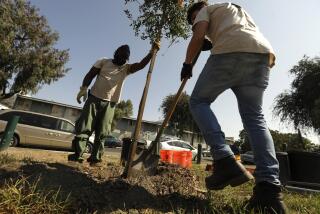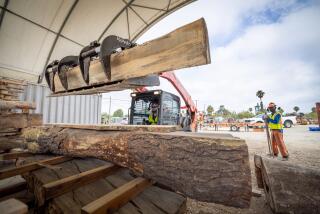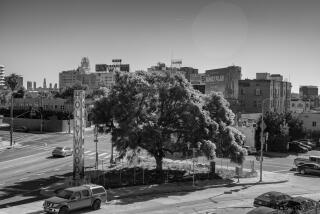Environment : On Iberian Peninsula, a Protest Grows Over Trees : Eucalyptus trees to be exact. Farmers say groves of them are a threat to their lifestyle and are pulling them out of the ground.
- Share via
LISBON — Huge man-made forests of fast-growing eucalyptus trees, blue-green strangers from Australia and Tasmania, are changing the face of the Iberian Peninsula. It is good business, but not everybody thinks it is a good idea.
In remote, often backward villages of Portugal and Spain, new forests that promise profit also challenge history. They threaten folkways and homespun lifestyles that have endured for centuries. In Iberia, the eucalyptus awakens great passion.
The 300 inhabitants of Tazones, a Spanish village on the Bay of Biscay, revolted against eucalyptus. By night they crept into the surrounding countryside and uprooted thousands of seedlings planted the day before. The same thing happened in the Asturian village of Luarca.
Near the town of Valpacos in northern Portugal, 2,000 farmers battled police to destroy intruder eucalyptus in what had been an olive grove. In another Portuguese village, farmers chained themselves to tractors to stop land from being cleared for eucalyptus.
In Iberia, where eucalyptus for paper pulp is an increasingly important cash crop, farmers are joined in their opposition by environmentalists and leftist political parties. They say it is ruinous to the environment, and to the fabric of rural society, turning farm towns into ghost towns. The eucalyptus is nicknamed the “fascist” or “capitalist” tree in Portugal for the wealth it supposedly brings land owners and industrialists at the expense of peasants and their land.
Iberia’s furor over a tree is testimony to a continental reality muted amid West Europe’s avid rush to integrate: The majority may benefit but a minority will suffer.
“Many of our peasants are poor and ignorant. They don’t know they can get together and have some say. Then the cellulose company comes in, full of money and pressures, and they sell out,” said Carlota Lagoa, a director of Portugal’s League for the Protection of Nature.
Between 2 million and 3 million acres of eucalyptus are now growing in Iberia, with most plantations sown in postwar decades. It grows well, but in tumult.
“There’s a lot of hostility, Spain worse than Portugal, but it’s the same as in every country where eucalyptus has been planted as a plantation crop. Everywhere, people rise up against it at first,” acknowledged Richard Howson Jr., the American chairman of Caima, one of four cellulose companies in Portugal that build clean, efficient and profitable eucalyptus forests for the paper pulp they produce.
In Portugal, an environmentalist group called Quercus, which has organized protests against eucalyptus, argues that large-scale planting of a single, fast-growing genus dries up water sources, causes soil erosion, ruins the beauty of the landscape, destroys wildlife and drives peasants from the land.
“Portugal has an archaic agriculture that uses a lot of manpower. The spread of the eucalyptus plantations makes men idle and forces them to migrate to other regions,” said Armando de Carvalho, vice president of Quercus.
In Spain, where environmentalists complain that eucalyptus is crowding out indigenous forests of native oak and beech in Galicia and La Coruna, ecologists say that traditional rural lifestyles, while not as profitable, provide more employment. By one study, an Iberian olive grove requires 199 worker-days per hectare (2.47 acres) to maintain each year, vineyards 128 worker-days and a eucalyptus plantation four worker-days.
Landowners are usually receptive to eucalyptus, but farmers hate to see land worked by their forefathers surrendered to a big company’s quiet trees. Shepherds don’t like to lose pastureland. Towns even resent the departure of sunshine from once-open land now still and forest-shaded. Eucalyptus forests are clean, and they are dull. Oil in the tree discourages bugs, which means fewer birds. There is no undergrowth in a managed forest, and little wildlife.
The introduction of a eucalyptus species will cause the landscape to change within five years, notes Lars Kardell, a Swedish professor of environmental forestry. “The people of Portugal have seen their olive plantations and vineyards replaced with 20-meter high, blue-green eucalyptus plantations, and it is easy to understand their criticism.”
Producers, which include government cellulose companies in both Spain and Portugal, say their forests do not damage the environment but instead promise a bright future for rural areas with indifferent soils that have been bypassed by Europe’s unprecedented prosperity.
“The problems come from remote and backward areas where the people have low levels of knowledge and low levels of income and from ecologists--who tend to be city people,” said Jorge Casquilho, director of planning and studies for Portugal’s National Forest Service.
One landmark United Nations study on the producer-environmentalist debate urges that no large-scale planting take place “without intelligent assessment of the social and economic consequences,” but it says “there can be no universal answer, either favorable or unfavorable, to the planting of eucalyptus.”
“The eucalyptus needs a lot of water, true, but so do other trees. We don’t plant where it would detract from the water supply,” said Howson. “They say you can’t use the soil after eucalyptus. Not true. It does as well as anything else at mulching. We plant only on the lowest graded soils, and we cannot touch protected trees like cork oak or olives.”
Last year, notes Casquilho, Portugal updated its forestry legislation to regulate eucalyptus. Portugal has more than its share of forest fires, but now it is forbidden to plant burned acres with eucalyptus. Neither can they be planted close to watercourses, or towns, or hilltops. Private forest owners are not allowed to replace cork oaks or elms with eucalyptus.
Iberia is a peninsular mirror of eucalyptus’ international wealth and weight. It is already clear that eucalyptus, in nearly 550 sundry and useful species, will be man’s first-choice forest for the 21st Century. The U.N. Food and Agriculture Organization says there were 1.4 million acres of eucalyptus planted around the world in 1955, but 10 million acres by 1980. Since then, eucalyptus plantations have expanded by around 450,000 acres per year, by FAO estimate.
In the United States, eucalyptus will grow only in California and Florida, but there are plantations in more than 100 countries where the tree is prized not only as a source of paper but also for windbreaks, timber and firewood. Eucalyptus already produces about one-third of the world’s pulp. And it makes money as well as paper: A eucalyptus produces twice as much wood pulp as a comparably sized pine.
In Portugal, 13% of forest land is planted in eucalyptus, compared with 21% cork oak and 40% pine, but National Forestry Service figures show that exports from eucalyptus, nearly doubling between 1985 and 1989, already generate more income than either pine or cork, of which Portugal produces half the world supply.
“The eucalyptus controversy,” as it is known in Spain, is downside counterpoint to the good news about the emerging frontier-free Europe. The birth of an integrated 12-nation market at the end of 1992 means the free movement of goods and people within the European Community. But it also ultimately means imposed change and psychic hardship for marginal, high-cost producers, like small Iberian farmers and stock raisers, who cannot compete in a free market.
“Marginal areas for agriculture shouldn’t be used for agriculture,” said Howson in a view shared by community planners.
Change is a particularly painful prospect for the Portuguese countryside, where, in some of the poorest areas of the new Europe, high agricultural production costs have historically been masked by government subsidies that must gradually vanish as Portugal lives up to the free-market obligations of its European Community membership. That means abolishing tariffs and import quotas, and reducing guaranteed high produce prices underwritten by every Portuguese government for half a century.
Spain and Portugal are both full members of the community, but in Portugal, particularly, life in the countryside is a long way from the Eurocrat’s carpeted world in Brussels. The difference between the sere minifundios-- small farms--of northern Portugal and the mechanized world of prosperous German, French and Dutch farmers is less one of degree than of century.
Portugal has the lowest level of agricultural productivity in the community, with yields averaging between one-quarter and one-fifth of those in other countries, according to Agriculture Minister Arlindo Cunha.
At least one-third of the rural population in Portugal is illiterate. While 18% of the national work force is employed in agriculture, it generates only 7% of national income.
In Portugal, marginal lands have been worked for generations for unirrigated cereal crops, or used for olives, unimproved pasture and scrub forest. Eucalyptus globulus planted three meters apart flourish on that sort of land with regimental precision. Trees can reach a mature height of around 90 feet in 15 years, although they are usually cut before then, and their resprouted stumps also harvested twice or three times.
“Walking in a forest we build is like visiting a cathedral: vaulted, hushed, peaceful,” said Howson.
That may be, but in the back-lands of Iberia, eucalyptus will never have the soul of the gnarled cork oak, or of the pine or beech that are the staples of nature and of history.
“It is a crime to transform our mountains into monumental stairways of eucalyptus,” said De Carvalho, referring to the terraces that boost productivity of the rich but widely resented immigrant trees.
More to Read
Sign up for Essential California
The most important California stories and recommendations in your inbox every morning.
You may occasionally receive promotional content from the Los Angeles Times.










